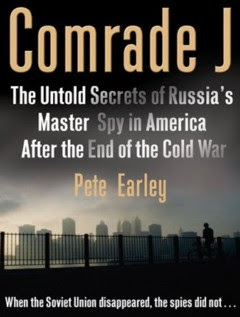I say that the Lorello case is not unique because there have been several well publicized examples of thefts by privileged insiders, especially from the massive National Archives in Washington. For example, who can forget the infamous thefts from NARA by a man with Top Secret security clearance - Sandy (Socks) Berger, a former National Security Advisor to Pres.William Jefferson Clinton. Berger was given VIP treatment by the archives staff - a private office to "research" in. Their courtesy allowed Sandy to steal documents by putting them inside his well elastized socks. [I posted his photo last year.] Celebrity thieves usually don't get punished of course. Our local exception was the Vancouver M.P. (a clever lad from Minnesota) Svend Robinson. Svend had the tragic misfortune to get caught the very first time he stole something; it was an expensive diamond ring. Still, it was public opinion and not our criminal courts which punished the wayward parliamentarian. Mr. Daniel Lorello, who co-authored a book on Civil War archives and occasionally lectures, is not famous enough to avoid a judge's sentencing.
The reason the Lorello thefts were given any attention at all was because giant eBay Inc. is embarrassed by the frequency with which its websites worldwide are being used to fence stolen archives and antiquities. This time around the online auction house offered to pay compensation to buyers who bought from Mr. Lorello, so that material would be quickly returned to Albany without triggering protracted battles over their possession. eBay has records of $68,000 in sales registered to Lorello, and will give buyers their money back. Lorello's annual base salary is $72,000, so clearly he had developed a very lucrative criminal sideline.
So far I have not been stung by an eBay seller, but I did come close early last year. Initially I was excited when an Ontario seller offered a few obscure items that would enhance the book I was then writing. The documents were preWW1 ephemera once owned by a University of Toronto medical student. When I realized the seller had set up a dummy account to bid up all the items in her eBay "store", I challenged her on it. Naturally she got hostile, so I dropped the email conversation. A few days later she admitted that eBay had cancelled her vendor account and asked if I would complete the purchase anyway. Fat chance!
I have made something of a hobby of compiling examples of theft from museums and archives over thirty years, some of which are boastful anecdotes collected from cocky contacts. It's a fascinating topic and though I've been tempted from time to time to intervene, to do so would be a suckers' game. It is to risk making enemies of staff at the very institutions where you might later seek goodwill for your own research project. ( In one messy NARA theft case just a few years back, over thirty librarians and archivists wrote letters of support for a greedy thief who had been caught red handed. The lesson is that folks with university degrees can close ranks as tightly around a friend as do teamsters.) The majority of Canadian archivists are true watchdogs for heritage, but the one time I informed on a thief to the National Archives in Ottawa, I felt my complaint was blown off. Theft, especially of "old stuff" as some people term it, is not a big deal in this country. And if our courts will not punish, it's pointless to accuse. In the U.S. though, theft from archives is a bigger story.
 Lorello sold many stolen documents and photos with ease, but this 1823 letter, signed by South Carolina politician and Vice President, John C. Calhoun, finally tripped him up. It had been referenced in a published work, and an honest eBay bidder blew the whistle.
Lorello sold many stolen documents and photos with ease, but this 1823 letter, signed by South Carolina politician and Vice President, John C. Calhoun, finally tripped him up. It had been referenced in a published work, and an honest eBay bidder blew the whistle.
 N.Y. State employee Daniel Lorello, holds a Masters Degree in History and is a recognized authority on Civil War records. This photo, showing him in cuffs, is from his arrest record.
N.Y. State employee Daniel Lorello, holds a Masters Degree in History and is a recognized authority on Civil War records. This photo, showing him in cuffs, is from his arrest record. The Lorello book mentioned in news reports, is currently listed on eBay. Ironic perhaps. At least one Civil War photograph collector, who purchased three stolen CDVs from Daniel Lorello, has returned the state owned property.
The Lorello book mentioned in news reports, is currently listed on eBay. Ironic perhaps. At least one Civil War photograph collector, who purchased three stolen CDVs from Daniel Lorello, has returned the state owned property. 



